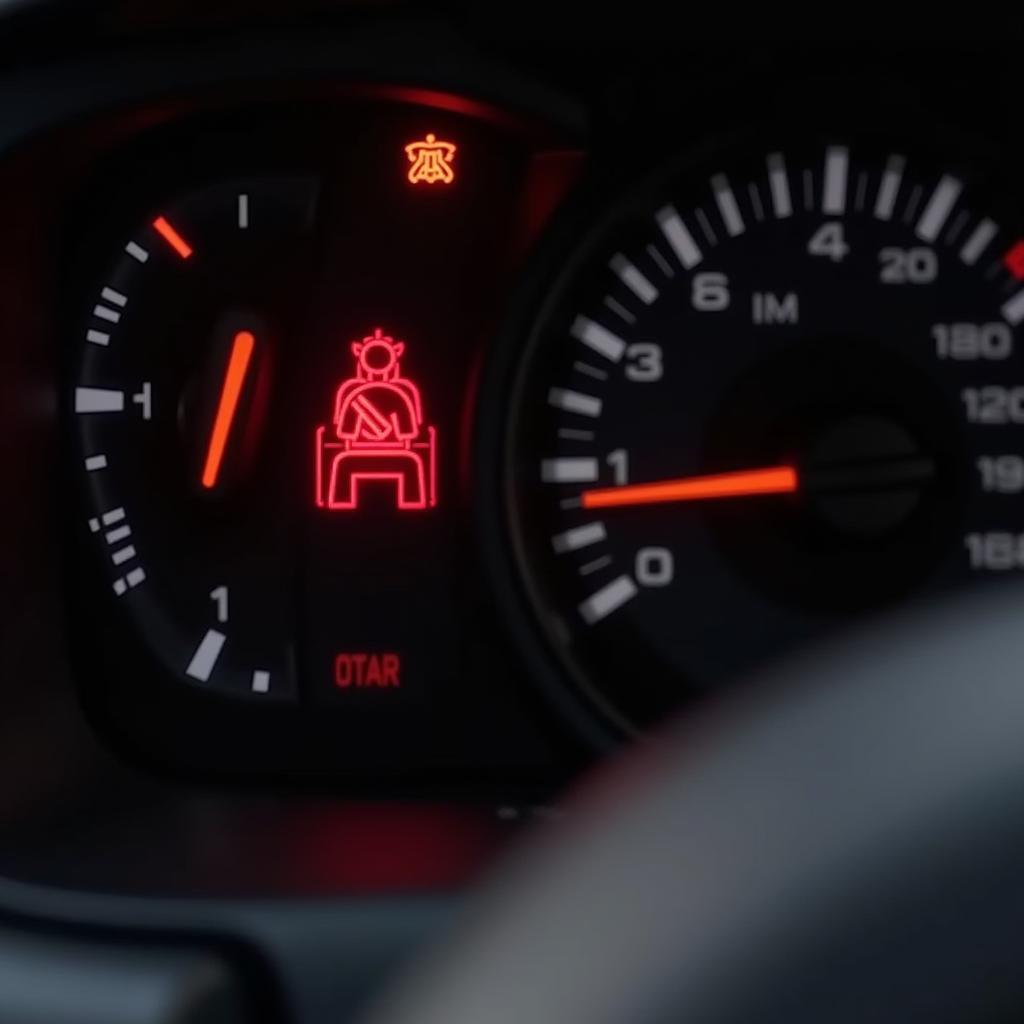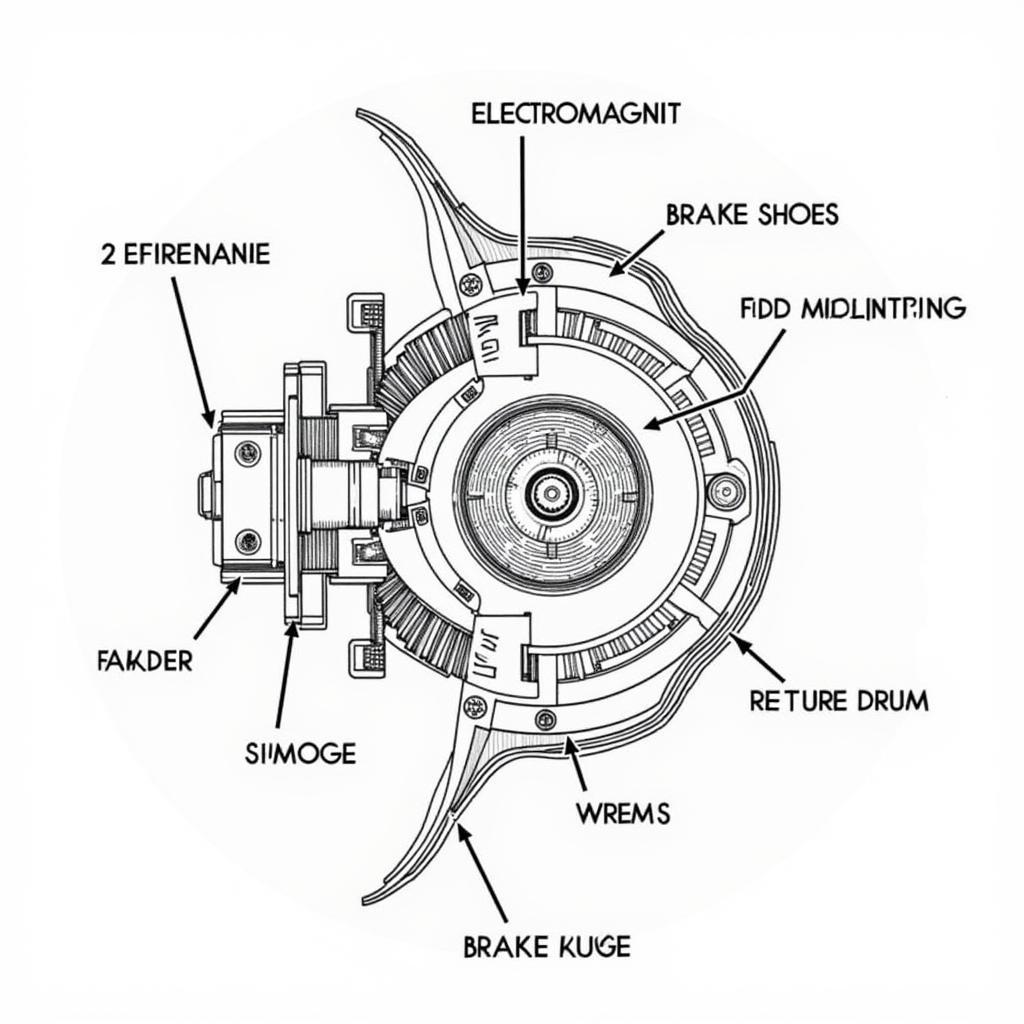The parking brake warning light, often symbolized by a red circle with an exclamation mark (!) or the letter “P” inside, is a crucial indicator on your dashboard. It signals a potential issue with your parking brake system. While the light’s primary purpose is to remind you to disengage the parking brake before driving, its illumination even after release can indicate various underlying problems.
Understanding the Parking Brake Warning Light
This light is designed to illuminate when the parking brake, also known as the emergency or handbrake, is engaged. This serves as a visual reminder to prevent driving with the brake on, which can lead to damage and safety hazards. However, the parking brake warning light can mean more than just an engaged brake.
Common Causes of a Parking Brake Warning Light
Here are some common reasons why your parking brake warning light might be on:
-
Engaged Parking Brake: The simplest explanation is often the most likely. Ensure you have completely released the parking brake lever or disengaged the electronic parking brake button.
-
Low Brake Fluid: The parking brake system often shares fluid with your main hydraulic brakes. If the brake fluid level drops too low, the warning light might illuminate.
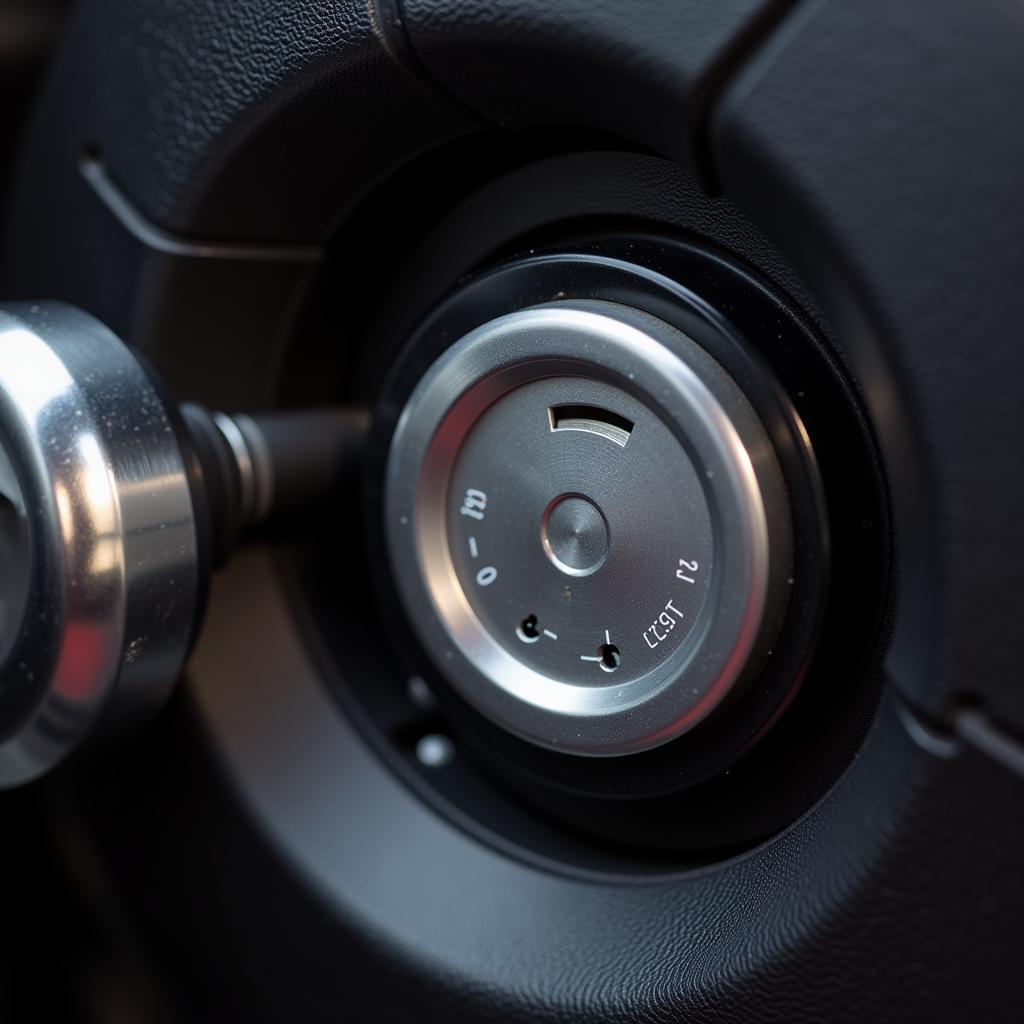 Car Brake Fluid Reservoir Low
Car Brake Fluid Reservoir Low -
Worn Brake Pads: While not directly linked to the parking brake, worn brake pads can trigger the same warning light in some cars. This usually indicates a need for a brake inspection and potential pad replacement.
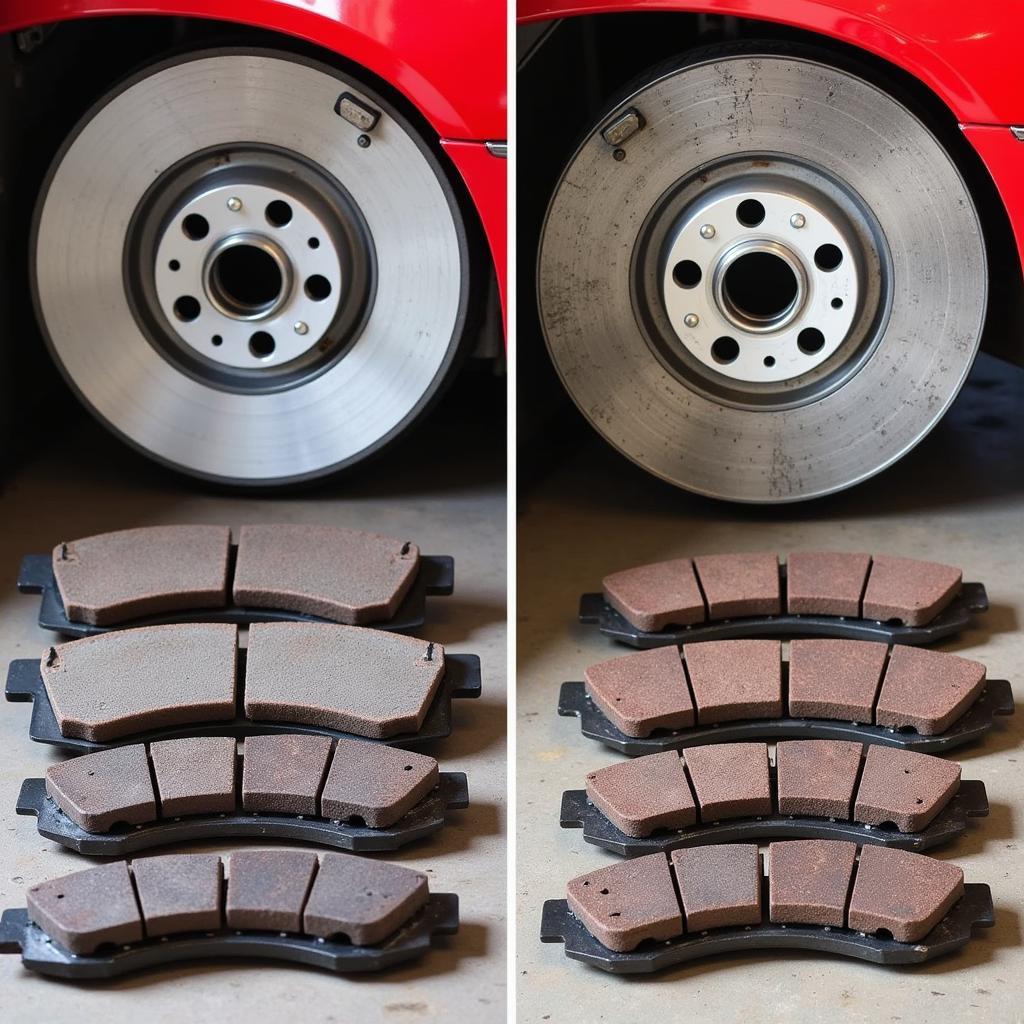 Worn Brake Pads and Rotors
Worn Brake Pads and Rotors -
Faulty Parking Brake Switch: A malfunctioning switch at the parking brake lever or button can send a false signal to the dashboard, causing the light to stay on.
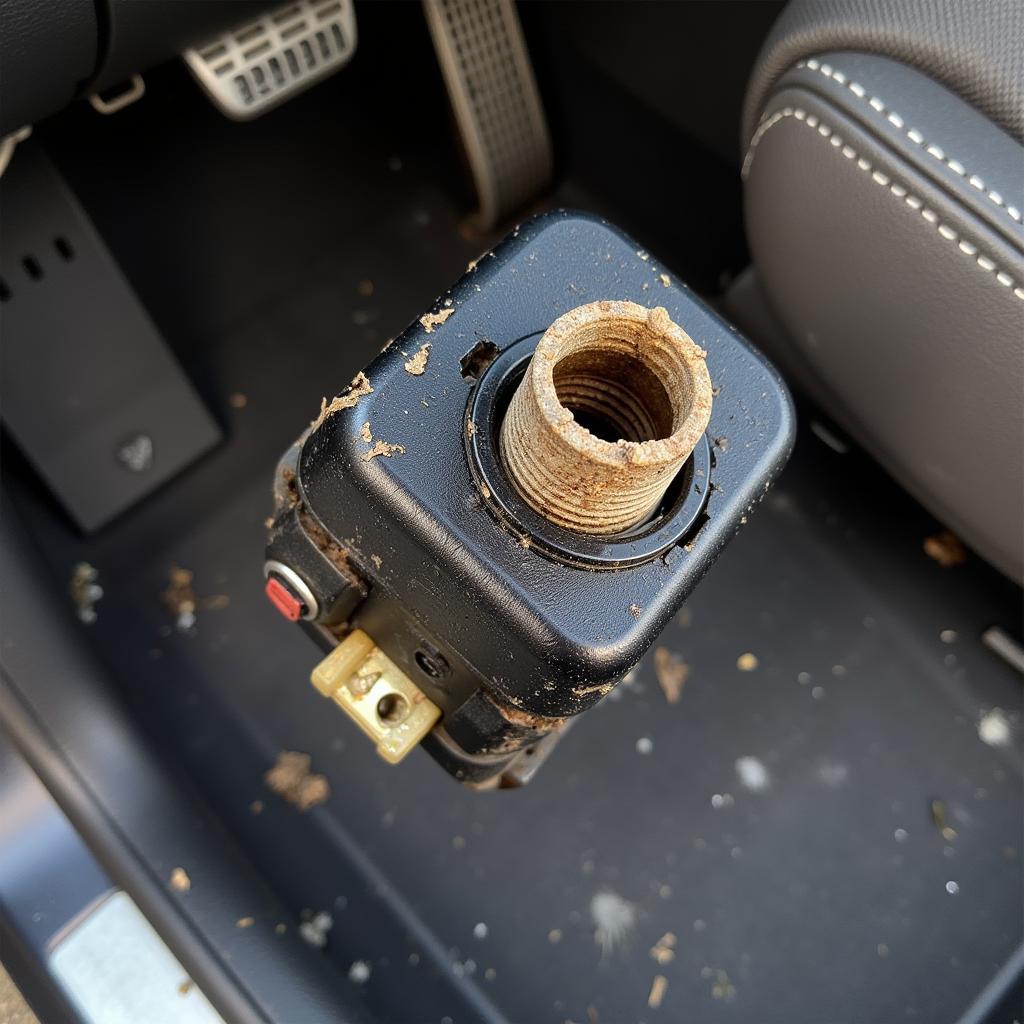 Car Parking Brake Switch Malfunction
Car Parking Brake Switch Malfunction -
Parking Brake Cable Issues: A stretched, stuck, or broken parking brake cable can prevent the brake from releasing properly or engaging fully, leading to the warning light illuminating.
-
Electrical Problems: Wiring issues, loose connections, or a faulty sensor within the parking brake system can also trigger the warning light.
What to Do When the Parking Brake Warning Light Stays On
Ignoring a persistent parking brake warning light can lead to further damage and safety concerns. Here’s what to do:
-
Double-Check the Parking Brake: Make sure it’s fully disengaged. If you have an electronic parking brake, try engaging and disengaging it a few times.
-
Inspect Brake Fluid Level: Check the brake fluid reservoir. If it’s low, adding brake fluid might temporarily resolve the issue, but it’s crucial to have your brake system inspected for leaks.
-
Seek Professional Help: If the light persists, it’s best to consult a qualified mechanic specializing in automotive electrical and brake systems. They can diagnose the problem accurately using advanced diagnostic tools and recommend the necessary repairs.
Diagnosing and Resolving Parking Brake Issues Remotely
In today’s technologically advanced world, some automotive issues, including those related to the parking brake, can be diagnosed and even resolved remotely. Services offering remote diagnostics, programming, and software installation can provide quick and efficient solutions for certain car problems.
For instance, if a faulty sensor or software glitch is causing the parking brake warning light to illuminate, a remote specialist might be able to identify and rectify the issue by accessing your car’s computer system remotely.
Expert Insight
“Many modern vehicles have sophisticated electronic parking brake systems,” says John Miller, a seasoned automotive electrical systems engineer. “These systems rely on sensors, actuators, and complex software to function correctly. When a problem arises, pinpointing the root cause requires specialized knowledge and equipment.”
He adds, “Remote diagnostics can be incredibly beneficial in these situations, offering faster and often more cost-effective solutions compared to traditional repair methods.”
Preventing Future Parking Brake Problems
Here are some preventive measures to minimize the risk of parking brake issues:
- Regular Maintenance: Adhere to your car manufacturer’s recommended maintenance schedule, including brake inspections and fluid flushes.
- Engage Parking Brake Regularly: Even when parked on a level surface, engaging the parking brake helps maintain its functionality and prevents the cable from seizing.
- Avoid Overloading: Excessive weight in your vehicle, especially when parked on an incline, puts extra stress on the parking brake system.
Conclusion
The parking brake warning light is an essential safety feature in your vehicle. Understanding what it means and responding promptly to its illumination ensures your safety and the optimal performance of your car’s braking system. While a simple oversight might be the cause, persistent warning lights warrant immediate attention from a qualified mechanic. Remember, regular maintenance and proactive care are key to preventing future parking brake problems.
FAQs
1. Can I drive with the parking brake light on?
It’s highly discouraged. Driving with the parking brake engaged, even partially, can lead to brake damage, overheating, reduced fuel efficiency, and potential safety hazards.
2. Is it safe to add brake fluid myself?
While you can add brake fluid temporarily, it’s crucial to have a mechanic inspect the system for leaks, as a low fluid level often indicates a bigger problem.
3. How often should I have my parking brake inspected?
It’s recommended to have your parking brake inspected at least once a year or as part of your regular brake maintenance schedule.
4. How much does it cost to fix a parking brake problem?
The cost varies widely depending on the issue’s cause, car model, and labor rates. Simple fixes like a faulty switch might cost less than $100, while complex repairs involving cable replacement or electronic system issues can cost several hundred dollars.
5. Can a remote diagnosis fix all parking brake problems?
While remote diagnostics can effectively identify and address certain software or sensor-related issues, physical damage to the parking brake components will require hands-on repair.

